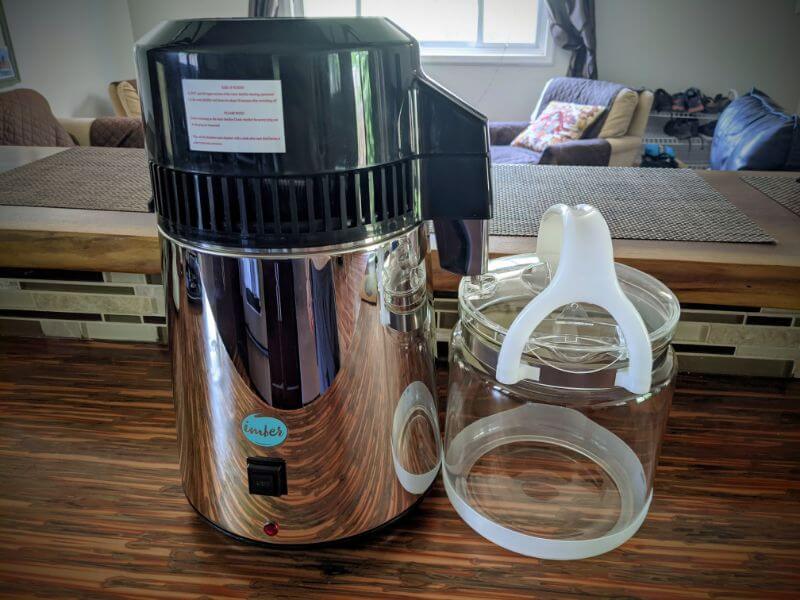There are many different types of water, and each type has its own benefits and drawbacks.
In this article, you’ll learn about the advantages and disadvantages of drinking the 10 most common types of water, and which types of water are safest and healthiest to drink. The article will also look at which types of water are the least safe to drink, and how to make sure your water is safe to drink.
The different types of water are listed below.
Table of Contents
🚰 Tap Water
Tap water is water that comes from a public drinking water supply, also known as the municipal drinking water system. It’s treated by your local authority before being delivered to your home through a network of pipes and pumps.
Related: What effect does carbon dioxide have on tap water?

What’s Good about Tap Water?
The biggest advantage of tap water is that it’s available to everyone and costs little. This form of water is disinfected with chlorine or chloramine to remove potentially dangerous impurities.
According to the Environmental Protection Agency (EPA), the municipal drinking water supply in the US is one of the most reliable and safest in the world. Every year, most Americans drink an average of three glasses of tap water each day with no harmful effects.
What’s Bad About Tap Water?
Although tap water is considered safe to drink, it may come with some health risks if it contains trace amounts of lead, copper, bacteria or fluoride.
Many tap water supplies contain traces of contaminants like heavy metals, dissolved solids, disinfectants like chlorine, and chemical byproducts from industrial and agricultural processes.
🕳️ Well Water
Well water is groundwater that comes from a well. Most wells are drilled to access underground sources of water, known as aquifers.

It is estimated that about 35 percent of US households drink well water. Some households have their own private wells, while others share a public-supply well.

What’s Good about Well Water?
Well water often has a high content of essential minerals because water in the aquifer has seeped through layers of rocks and soil.

Well water is also free of impurities that are added to municipal drinking water supplies, such as chlorine and fluoride, making it tastier and healthier than other types of drinking waters. You can also filter your well water to remove any impurities you don’t like the taste of.
What’s Bad About Well Water?
Well water usually contains several types of harmful contaminants, including radon, arsenic, nitrates and chemical pollutants. Well water is also more likely to contain minerals like iron and manganese, which can damage your plumbing and leave surface staining.

Unlike public drinking water, well water isn’t regulated by the EPA, and it’s the well owner’s responsibility to make sure their water is safe. Well water can pose serious health risks if it’s untreated.
🗻 Glacier or Spring Water
Spring water comes from a natural spring or underground source. Spring water distributors claim that the water is bottled at the source in either plastic bottles or glass bottles to maintain its purity.
Glacier water is typically collected from melting ice caps in mountain valleys or regions of active volcanos. Glacier water is also claimed to be bottled at the source in plastic bottles or glass bottles.

What’s Good about Glacier or Spring Water?
Glacier and spring waters contain essential minerals including magnesium, calcium and silica. These waters should be free of harmful tap water contaminants like chlorine.
Glacier and spring water, bottled and sold in stores around the world, are both widely available water types.
What’s Bad About Glacier or Spring Water?
Like well water, glacier or spring water may contain types of harmful contaminants such as nitrates, arsenic and chemical pollutants. The EPA encourages people to check the quality of their bottled water before buying.
Bottled spring and glacier water is considered generally safe, but bottled water tends to be more expensive than tap water. Plus, if you drink water exclusively from single-use plastic bottles, you won’t be benefiting the environment.
🏞️ Mineral Water
Mineral water is bottled from a natural mineral spring. Minerals in the ground usually mix with underground water, which forms a natural “mineral” spring and becomes naturally filtered and purified through the soil and rock over time.

What’s Good about Mineral Water?
Mineral water has a higher pH because it contains high concentrations of magnesium, calcium and silica – and all three of these minerals have important health benefits. Some studies have shown that regularly drinking mineral water may improve health and aid bone health and maintenance.
What’s Bad About Mineral Water?
Mineral water typically costs more than tap or well water, and some types of mineral water contain large amounts of sodium and/or sulfates.
Like spring and glacier-derived water products, mineral water is most commonly available in single-use plastic bottles, so this type of water isn’t an environmentally friendly choice.
💫 Sparkling Water
Sparkling water is also known as seltzer, soda water, carbonated water, or club soda. Sparkling water is bubbly and naturally effervescent, which is why it’s sometimes referred to as soda water.
Some types of sparkling water are naturally carbonated, while others are artificially flavored and carbonated.

What’s Good about Sparkling Water?
Sparkling waters contain carbon dioxide and minerals such as calcium, magnesium and sodium. Some sparkling waters are infused with antioxidants, which provide health benefits including anti-aging benefits and reduced cancer risk.
Soda water can encourage hydration in people who don’t enjoy the taste of still water.
What’s Bad About Sparkling Water?
Many varieties of soda water contain added sugars or artificial sweeteners. Some brands of sparkling water may add sodium to their products, which can increase the risk for health problems like high blood pressure and obesity.
🧴 Infused or Flavored Water
Infused or flavored waters are waters with added ingredients, which can include any combination of fruits, vegetables, herbs and/or spices.
You can buy bottled infused or flavored waters, or make your own infused water at home.

What’s Good about Infused or Flavored Water?
Flavored water typically has minimal calories compared to other beverages like soda and juice. Some varieties of flavored water can provide hydration while also adding beneficial antioxidants and nutrients from the added ingredients.
You can easily make your own infused or flavored water at home, so there’s no need to buy bottled water if you’re trying to reduce your plastic intake.
The enjoyable flavor of infused water makes you more inclined to drink, helping you to stay hydrated.
What’s Bad About Infused or Flavored Water?
Many bottled flavored waters have added sugars or artificial sweeteners, so they’re not a healthy choice for children and people with diabetes.
Also, many types of flavored water contain a significant amount of added sodium, which can increase your risk for health problems. Making your own infused water at home is the healthier choice, but takes more effort.
💦 Purified Water
Purified water is tap water that has been treated to remove contaminants and bacteria, making it cleaner than tap or well water.
You can find purified bottled waters at your local store, or purify your water using a treatment system at home.

What’s Good about Purified Water?
Eliminating harmful contaminants from your water can improve your health, especially if you drink a lot of tap or well water.
Purified drinking water is completely free from impurities – it literally is pure water. This makes purified water one of the safest forms of water available today.
What’s Bad About Purified Water?
The biggest issue with purification is that it doesn’t only remove harmful contaminants – it also removes beneficial minerals and electrolytes.
Purified water also has a lower pH, which means it’s more likely to pick up heavy metals from pipes or containers.
🌀 Filtered Water
Filtered water is water that has been filtered, usually with a cartridge filter, to remove a selection of harmful contaminants. Although filtered water isn’t completely pure, it doesn’t contain common contaminants like chlorine and heavy metals.
You can filter your water at home using a filtration system.

What’s Good about Filtered Water?
The major benefit of filtered water is that it’s free from a range of impurities, but it still contains healthy minerals. Filtering water doesn’t affect the water’s natural pH level, either, so you can still enjoy an alkaline drink with a higher pH.
Filtering your own water supply at home is more affordable than buying bottled alternatives, but provides similar health benefits.
What’s Bad About Filtered Water?
Filtered water might have a high mineral content, but filtration isn’t as effective as a purification process like reverse osmosis. For this reason, filtered water still contains trace contaminants that may be unsafe to drink.
♨️ Distilled Water
Compared to filtered water, distilled water has a very low mineral content. This type of water is essentially regular H20 with all elements – including minerals, salts, and particulates – removed from it.
Water is distilled by boiling, evaporating, and condensing. The contaminants that can’t evaporate are left behind in the boiling chamber.

What’s Good about Distilled Water?
Distilled water is the purest form of H2O because it goes through a rigorous purification process. In addition to being free of impurities, water from a distiller also lacks inorganic minerals and chemicals.
What’s Bad About Distilled Water?
While some people like that distilled water is completely free of impurities, it doesn’t provide any nutritional value because it lacks minerals and electrolytes. It also has an unnatural, flat taste.
💧 Alkaline Water
Alkaline water is regular water with a higher-than-normal pH level. Alkaline water is the product of a two-step process that involves purifying regular tap or well water and then infusing it with minerals and adjusting it’s pH. Alkaline water can also be made in an ionizer or alkaline machine.

What’s Good about Alkaline Water?
Some alkaline water sellers suggest that drinking alkaline water can help improve your body’s overall pH balance, which may be beneficial to people with acid reflux or any condition related to high acidity levels in the blood.
What’s Bad About Alkaline Water?
There’s currently very little evidence to show that alkaline water is effective at helping to maintain a healthy blood pH level. In fact, there are some health risks associated with drinking alkaline water, including lowered stomach acidity, skin irritation, and gastrointestinal issues.
🙋♀️ Drinking Water FAQs
What’s the Healthiest Water to Drink?
If you’re wondering which of the different types of water are best for your health, there are several waters to consider.
The healthiest water to drink is filtered or mineral water. This type of drinking water is free from contaminants but still contains a good amount of healthy minerals and electrolytes.
Other healthy waters are soda water and infused water, as long as these don’t have added sodium, sugars, or sulfates.
All types of water have their own health benefits and downfalls. For instance, purified water is technically very healthy because it lacks all dangerous contaminants, but it also lacks beneficial minerals. You’ll need to determine for yourself which type of water is best for you.
Related Article: Is rain water safe to drink?

What’s the Safest Water to Drink?
Purified tap or bottled water is typically filtered using reverse osmosis, which removes just about anything harmful in your tap or well water. This makes purified water the safest drinking option, although that doesn’t necessarily mean that it’s best for your health.
What’s the Most and Least Environmentally Friendly Water to Drink?
Tap water is the most environmentally friendly choice because inexpensive and doesn’t require expensive manufacturing processes or plastic packaging. Of course, tap water still requires chemical treatment, so even this type of water isn’t 100% environmentally friendly.
Bottled water of any kind is the least environmentally friendly water because of the plastic waste involved in drinking this type of water.
Reverse osmosis filtration is another of the least environmentally friendly choices because the RO process wastes water.
Which Types of Water are the Least Safe for Drinking?
Although all the waters on this list are considered safe, some waters contain harmful impurities that could be unsafe to consume. Untreated well water is the least safe for drinking, followed by tap water.
Some people would argue that distilled water is one of the least safe waters because it’s lacking in nutrients and electrolytes.
How Can I Make Sure my Water is Safe to Drink?
The best way to ensure you have the healthiest and safest water is to filter it using a filtration system. Cartridge filters work for most situations, but aren’t as effective as purification systems at filtering out a wide range of harmful chemicals. The most effective solution is to use reverse osmosis, followed by a remineralization filter, to purify your water and re-introduce healthy minerals before drinking.
If you don’t know whether your tap water is safe for drinking, arrange to get your water tested for the most common contaminants. You can buy an at-home testing kit or arrange for laboratory testing, which provides a more detailed analysis of your water quality.

Which Type of Water Tastes The Best?
The safest and healthiest water doesn’t necessarily taste the best. Mineral, tap, and well water typically have an enjoyable taste because they’re naturally high in minerals. Of course, this depends on what else is in the water, as some impurities taste unpleasant.
Infused or flavored water also has an enjoyable flavor, and taste varies depending on which fruits, vegetables or herbs are infused or used as flavorings.


thanks for the information. Full of knowledge